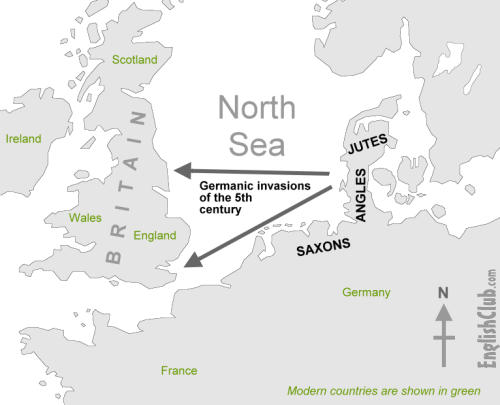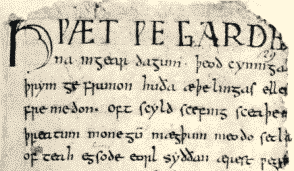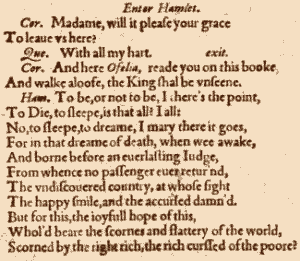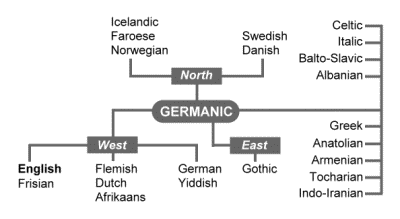History of the English Language
A short history of the origins and development of English
The history of the English language really started with the arrival of three Germanic tribes who invaded Britain during the 5th century AD. These tribes, the Angles, the Saxons and the Jutes, crossed the North Sea from what today is Denmark and northern Germany. At that time the inhabitants of Britain spoke a Celtic language. But most of the Celtic speakers were pushed west and north by the invaders - mainly into what is now Wales, Scotland and Ireland. The Angles came from "Englaland" [sic] and their language was called "Englisc" - from which the words "England" and "English" are derived.
Germanic invaders entered Britain on the east and south coasts in the 5th century.
Old English (450-1100 AD)

Part of Beowulf, a poem written in Old English. |
The invading Germanic tribes spoke similar languages, which in Britain developed into what we now call Old English. Old English did not sound or look like English today. Native English speakers now would have great difficulty understanding Old English. Nevertheless, about half of the most commonly used words in Modern English have Old English roots. The words be, strong and water, for example, derive from Old English. Old English was spoken until around 1100.
Middle English (1100-1500)

An example of Middle English by Chaucer. |
In 1066 William the Conqueror, the Duke of Normandy (part of modern France), invaded and conquered England. The new conquerors (called the Normans) brought with them a kind of French, which became the language of the Royal Court, and the ruling and business classes. For a period there was a kind of linguistic class division, where the lower classes spoke English and the upper classes spoke French. In the 14th century English became dominant in Britain again, but with many French words added. This language is called Middle English. It was the language of the great poet Chaucer (c1340-1400), but it would still be difficult for native English speakers to understand today.
Modern English
Early Modern English (1500-1800)
Towards the end of Middle English, a sudden and distinct change in pronunciation (the Great Vowel Shift) started, with vowels being pronounced shorter and shorter. From the 16th century the British had contact with many peoples from around the world.
 Hamlet's famous "To be, or not to be" lines, written in Early Modern English by Shakespeare.
Hamlet's famous "To be, or not to be" lines, written in Early Modern English by Shakespeare. |
This, and the Renaissance of Classical learning, meant that many new words and phrases entered the language. The invention of printing also meant that there was now a common language in print. Books became cheaper and more people learned to read. Printing also brought standardization to English. Spelling and grammar became fixed, and the dialect of London, where most publishing houses were, became the standard. In 1604 the first English dictionary was published.
Late Modern English (1800-Present)
The main difference between Early Modern English and Late Modern English is vocabulary. Late Modern English has many more words, arising from two principal factors: firstly, the Industrial Revolution and technology created a need for new words; secondly, the British Empire at its height covered one quarter of the earth's surface, and the English language adopted foreign words from many countries.
Varieties of English
From around 1600, the English colonization of North America resulted in the creation of a distinct American variety of English. Some English pronunciations and words "froze" when they reached America. In some ways, American English is more like the English of Shakespeare than modern British English is. Some expressions that the British call "Americanisms" are in fact original British expressions that were preserved in the colonies while lost for a time in Britain (for example trash for rubbish, loan as a verb instead of lend, and fall for autumn; another example, frame-up, was re-imported into Britain through Hollywood gangster movies). Spanish also had an influence on American English (and subsequently British English), with words like canyon, ranch, stampede and vigilante being examples of Spanish words that entered English through the settlement of the American West. French words (through Louisiana) and West African words (through the slave trade) also influenced American English (and so, to an extent, British English).Today, American English is particularly influential, due to the USA's dominance of cinema, television, popular music, trade and technology (including the Internet). But there are many other varieties of English around the world, including for example Australian English, New Zealand English, Canadian English, South African English, Indian English and Caribbean English.The Germanic Family of Languages

English is a member of the Germanic family of languages.
Germanic is a branch of the Indo-European language family. | A brief chronology of English |
|---|
| 55 BC |
Roman invasion of Britain by Julius Caesar. |
Local inhabitants speak Celtish |
| AD 43 |
Roman invasion and occupation. Beginning of Roman rule of Britain. |
| 436 |
Roman withdrawal from Britain complete. |
| 449 |
Settlement of Britain by Germanic invaders begins |
| 450-480 |
Earliest known Old English inscriptions. |
Old English |
| 1066 |
William the Conqueror, Duke of Normandy, invades and conquers England. |
| c1150 |
Earliest surviving manuscripts in Middle English. |
Middle English |
| 1348 |
English replaces Latin as the language of instruction in most schools. |
| 1362 |
English replaces French as the language of law. English is used in Parliament for the first time. |
| c1388 |
Chaucer starts writing The Canterbury Tales. |
| c1400 |
The Great Vowel Shift begins. |
| 1476 |
William Caxton establishes the first English printing press. |
Early Modern English |
| 1564 |
Shakespeare is born. |
| 1604 |
Table Alphabeticall, the first English dictionary, is published. |
| 1607 |
The first permanent English settlement in the New World (Jamestown) is established. |
| 1616 |
Shakespeare dies. |
| 1623 |
Shakespeare's First Folio is published |
| 1702 |
The first daily English-language newspaper, The Daily Courant, is published in London. |
| 1755 |
Samuel Johnson publishes his English dictionary. |
| 1776 |
Thomas Jefferson writes the American Declaration of Independence. |
| 1782 |
Britain abandons its colonies in what is later to become the USA.
|
| 1828 |
Webster publishes his American English dictionary. |
Late Modern English |
| 1922 |
The British Broadcasting Corporation is founded. |
| 1928 |
The Oxford English Dictionary is published. |
تاريخ اللغة الانجليزية
في منتصف القرن الخامس الميلادي بدأت جماعات قبائل الإنجليز و الساكسون و الجوت بالنزوح من مواطنهم الأصلية في سهول شمال أوربا (ما بين شمال ألمانيا و هولندا الحاليتين) إلى جزيرة بريطانيا مالئين الفراغ الجيوسياسي الذي حل بها بعد قرار الرومان المفاجئ بالانسحاب منها، دافعين أمامهم الشعوب التي كانت تسكن الجزيرة من قبلهم إلى الغرب و الشمال، بينما استقروا هم في الجنوب.
باندماج المكونات الثقافية للقبائل الوافدة ظهرت الإنجليزية القديمة التي تأثرت أيضا بلغة أخرى هي النرويجية القديمة. ثم تأثرت بالدنماركية لغة الفايكنج الذين استعمروا معظم السواحل الشرقية للجزيرة في القرن الثامن الميلادي.
في عام 1066م، غزا النورمان إنجلترا قادمين من إقليم نورماندي على السواحل الفرنسية المقابلة. كانت الطبقة الحاكمة النورمانية تتحدث لهجة فرنسية قديمة متأثرة بالنرويجية، فأصبحت لغتهم لمئات السنين هي لغة الحديث ومن قبلها لغة الإدارة والقانون في إنجلترا اي اللغة الرسمية .
عندما عادت الإنجليزية لغة للحديث في العصور الوسطى، كانت قد اكتسبت الكثير من مقومات اللغات اللاتينية عن طريق النورمانية و الفرنسية، و اصبحت أبعد كثيرا عن أصولها الجرمانية مما كانت عنه الأنجلوساكسونية.
ومرت بثلاث مراحل وهي :
1) اللغة الانجليزية القديمه Old English
وكانت تستخدم تقريبا من القرن الخامس حتى الحادي عشر ميلادي
وهذا نص منها :
Hwæt! Wē Gār-Dena in geārdagum,
þēodcyninga, þrym gefrūnon,
hū ðā æþelingas ellen fremedon.
Oft Scyld Scēfing sceaþena þrēatum,
monegum mǣgþum, meodosetla oftēah,
egsode eorlas. Syððan ǣrest wearð
fēasceaft funden, hē þæs frōfre gebād,
wēox under wolcnum, weorðmyndum þāh,
oðþæt him ǣghwylc þāra ymbsittendra
ofer hronrāde hȳran scolde,
gomban gyldan. þæt wæs gōd cyning!
واذا قارناه بالانجليزية الحالية فانها تعني :
Lo, praise of the prowess of people-kings
of spear-armed Danes, in days long sped,
we have heard, and what honor the athelings won!
Oft Scyld the Scefing from squadroned foes,
from many a tribe, the mead-bench tore,
awing the earls. Since erst he lay
friendless, a foundling, fate repaid him:
for he waxed under welkin, in wealth he throve,
till before him the folk, both far and near,
who house by the whale-path, heard his mandate,
gave him gifts: a good king he!
2) الانجليزية الوسطى Middle English
وكانت تستخدم تقريبا من القرن 11 الى 15 ميلادي
وهذا نص منها :
Whan that Aprill, with his shoures soote
The droghte of March hath perced to the roote
And bathed every veyne in swich licour,
Of which vertu engendred is the flour;
Whan Zephirus eek with his sweete breeth
Inspired hath in every holt and heeth
The tendre croppes, and the yonge sonne
Hath in the Ram his halfe cours yronne,
And smale foweles maken melodye,
That slepen al the nyght with open eye
(So priketh hem Nature in hir corages);
Thanne longen folk to goon on pilgrimages
واليكم معاني بعض المصطلحات :
soote: sweet
swich licour: such liquid
Zephirus: the west wind (Zephyrus)
eek: also
holt: wood
the Ram: Aries, the first sign of the Zodiac
yronne: run
priketh hem Nature: Nature pricks them
hir corages: their hearts
3) الانجليزية الحديثة
واستخدمت منذ القرن 15 ميلادي تقريبا ومنهم من قسمها الى :
انجليزية حديثة متاخرة : وهي ايام سكشبير ورفاقه
وانجليزية حديثة متقدمة ابتداءت منذ القرن 17 او 18 ميلادي تقريبا
اما من اين اخذ الاسم :
فهو يعود الى اسم قبائل الانجليز وهم اهل اللغة الاصليين كما ذكر اعلا في تاريخهم










 رد مع اقتباس
رد مع اقتباس
